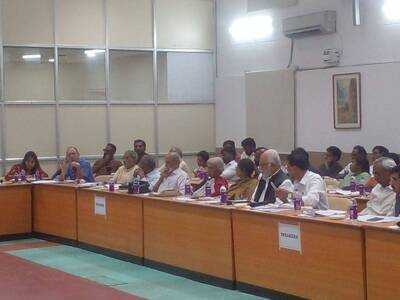
Hyderabad: Eminent professors from Telangana have in one voice rejected the University Grants Commission’s (UGC) regulations on the appointment of vice-chancellors and professors in the state universities.
A seminar on “UGC regulations- interference in state universities” held at the State Council of Educational Research and Training (SCERT) was held by the Telangana Education Commission on Thursday, February 6, which was attended by eminent professors from all public universities in Telangana.
The professors mainly focused on the regulations empowering the governors of states to constitute the search committee and appointment of vice-chancellors, and professors in state universities.
“This is a blow to democracy, and wherever these is an authoritarian regime, higher education system will take a blow,” said Professor Shantha Sinha, who suspected that it was an effort by the Centre to curb intellectualism.
She said that UGC is just a regulatory commission which had no authority to make laws, but was imposing penal provisions on not following its guidelines.
Professor PL Vishweshwar Rao said that as per the new regulations, the governor could now appoint anybody who is an expert in public policy, public administration, who may have headed a public sector undertaking, as a vice-chancellor of any university.
He further said that the governor will now have the power to re-appoint the same person as the vice-chancellor for a second term as well.
He said the universities were also being directed to introduce courses in the Indian knowledge system, which could be astrology, numerology, vedas, manusmriti, etc.
Also Read
Professor D Narasimha Reddy, who pointed out that there were 24 sets of regulations on the UGC’s website, said that it was because of the teachers’ unions and students’ bodies not taking the over-stepping of UGC seriously, it has come this far.
Noting that the private universities were given autonomy to appoint their own vice-chancellors, the public universities were not being given that freedom, despite the state governments being elected by the people.
“Even in theocratic states such things are not happening. The state government has full autonomy in regulating the higher education, and the academic council in the university has the autonomy in designing a course and regulating it,” he said.
On the UGC regulations relaxing the qualification of professors, and allowing the teachers to impart education in subjects not being their core areas of expertise, Akunuri Murali, chairman of Telangana education commission expressed concern over where it could lead the universities to.
“The Centre is trying to use the UGC politically to spread its ideology rapidly in the universities. To legitimate their methods, they have released the guidelines,” he observed.
On the regulation of asking all the contract lecturers in the universities to go through the process of regular recruitment, he said that there were many contract lecturers who have been teaching for 15-20 years, and they will all be pushed out of service as per the guidelines.
“Why are you relaxing the qualification of professors? How can a non-academic understand and manage the universities,” asked Professor G Haragopal, calling the UGC’s move as “complete intervention without any control.”
He felt that in the present era where “governors have become playboys,” such interference was a big threat to federalism.
Reminding that education was in the state list until an authoritarian government had come to power (during the emergency).
He said that only if political interference was there, universities could prosper.
Get the latest updates in , , , , and on & by subscribing to our channels. You can also download our app for and .